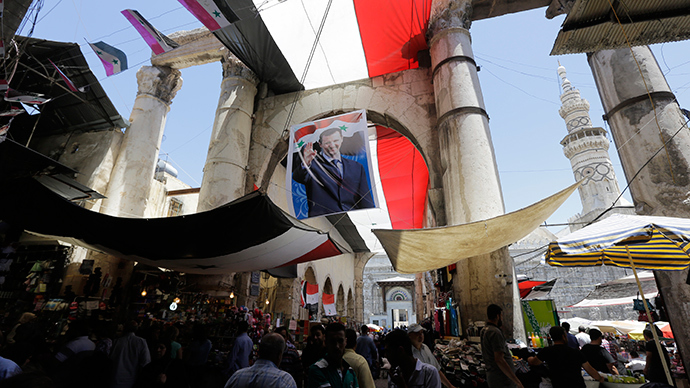‘Syrian elections show real Western contempt for democracy’

The West has been calling for democracy in Syria for years, and when the elections took place they not only denounced them but actually prevented some Syrians from voting outside the country, political writer and journalist Dan Glazebrook told RT.
RT:Do you think it will be possible for these elections to actually go ahead during the war?
Dan Glazebrook: Yes, they are going to go ahead, but obviously it is going to be difficult - the talk is that in the rebel-held areas it’s going to be difficult for them to take place, the rebels have boycotted the elections. Do not forget you have millions of Syrians abroad as well. The voting has already started in Lebanon and elsewhere. Millions of people are flooding the streets in Lebanon to go and register their vote. So the Syrian state is organizing them to the best of their ability.
What is interesting is that not so much problems holding the election in Syria, but countries like France, Germany and Belgium, as well the United Arab Emirates that are effectively preventing Syrian's from exercising their democratic right to vote… they are actually banning Syrians from voting in those countries where the Syrian state is actually trying to organize Syrians to vote. Those counties are banning them from doing so.
It really shows the contempt that the Western countries have for democracy. They have been calling for democracy in Syria for years, and when the elections take place they not only denounced them but actually banned Syrians from taking part in them. We can contrast turnout in places like Lebanon, and the enthusiasm and passion with which people are turning up to voting with lackluster support and low turnout in European elections all across Europe last week. For the West, democracy is not so much a principle - as a stick to beat third-world countries. And when actually democracy asserts itself and reveals itself as it is happening at the Syrian elections at the moment, the West is not interested - it tries to sabotage it. A lot has been revealed actually about the West’s attitude to what is taking place now in Syria.

RT:What are Assad's chances for re-election? And what happens to him if another leader is voted in?
DG: Assad will get re-elected; that is what all of the various experts from different political opinions are saying. The support for Assad is huge… this has been known. We know that Assad is going to win by one very simple test that is the fact that the West refused to recognize the result in advance. If they really thought there is a genuine hope of someone else winning, then of course they will be saying this is great democracy in Syria. But they have known the support for Assad is huge since 2011-2012. Several years ago there was an article by the Guardian’s Jonathan Steele, reporting on opinion policy in Syria, saying Assad will have 55 percent of the vote. And support for him has only increased since then because Syrians are increasingly aware of the mayhem caused in their country by the rebellion and its Western backers. People are being increasingly made aware of a false narrative at the beginning of the rebellion, which was presented as peaceful protesters being shot by Assad soldiers and then protesters armed themselves in response. That narrative now is increasingly unraveling, as more and more information comes out about the beginning of the insurgency, and evidence that snipers were not necessarily from Assad’s forces. We saw Western-backed rebels in places like Venezuela in 2002, as well as in Ukraine.
RT:What will these presidential polls ultimately do for Syria's future?
DG: I don’t think the polls themselves will change the balance of power. What changes the balance of power will happen on the ground, but it’s another nail in the coffin of this doomed insurgency; it is going to demoralize the rebels and the Western backers. Along with a massive government victory in Homs last month and Assad’s possible victory in the elections, along with a failure of the West to intimidate Russia and Iran in backing down, allowing the air strike at the end of last year - all of these things show really that the tide is with the Syrian government and this insurgency will be defeated. There is actually a red line in Syria for the US, Britain, France.
It is not the use of the chemical weapons, which Carla del Ponte has already said she suspects the rebels of using - that’s not the red line. The real red line is an imminent prospect of the Syrian government's victory on the ground. If that prospect arises as being really imminent, they will throw everything into the fight. That doesn’t necessarily mean air bombardment; they have shown they don’t necessarily have the nerve for that kind of war when there is Russian and Iranian opposition. But that does mean things like supporting Qatari, Saudi Arabian forces involved in forces on the ground, special forces at least in the training camps and on the borders, more involvement of CIA.

Back in Libya in 2011, months and months of bombing failed to have any impact on the leadership in Tripoli. Tripoli was only taken when Qatari ground forces led by British SAS stormed Tripoli. There were no Libyans in the leadership of the fall of Tripoli; that was a British-led Qatari forces campaign. Remember. There was a mandate that supposedly said “no foreign boots on the ground”. I do not know whether those Qataris and Brits were going barefoot, but it seems to me that the resolution was completely ignored there. And this shows us that they will break any resolution, they will break any terms of ceasefire, they will throw everything into this fight and there is a lot they still can do. In fact, again the Washington post has recently reported that their analysts and experts believe that we will see a lot more help going to the rebels from the West, via Saudi Arabia and Qatar in the months to come. There is a recent statement by John Kerry which was interesting, saying that they wasted the last year; they really need to step up the fire. The tiredness with the Syrian government, the rebels are being demoralized and these elections will be a part of this tide.
RT:Some of the main Syrian opposition groups are boycotting the poll. Why aren't they taking advantage of a chance to legitimize themselves?
DG: This is the mistake they have made from the very beginning. The political democratic demands of peaceful opposition such as there was in Syria, were met almost immediately by the Syrian government. By 2012 they already banned a one-party state, allowed the opposition parties and even had opposition elements from at least the peaceful opposition within the government, and then these presidential elections etc. The majority of the rebel groups refused to go along with that; they were always tempted by the West holding out this prospect, dangling this carrot of imminent intervention. We do not know whether it was sincere on the part of the West and they really hoped to do a Libya-style air strike, or they just wanted to tighten the rebels alone to encourage them not to negotiate with Assad to continue fighting, and hoping for a military solution that was never available in order to fulfill the Western policy of turning Syria into a dysfunctional state that is incapable of acting as independent regional player… in order to further Israeli hegemony in the region. Don’t forget, Israeli forces are already involved in the Syrian war - they have been bombing Syria. And Syria is the main backer and the main conduit for the Iranian arms to Hezbollah, which is the main anti-Israeli hegemonic group force in the region. So why does not the opposition want to get involved? They should stand on elections, but the truth is that they will not get anywhere. They are still hoping and praying that the West will bomb them into power as happened to Libya. It is a fantasy because I do not think the West have a stomach for doing that in the face of such opposition from Russia and Iran.
The statements, views and opinions expressed in this column are solely those of the author and do not necessarily represent those of RT.
The statements, views and opinions expressed in this column are solely those of the author and do not necessarily represent those of RT.













